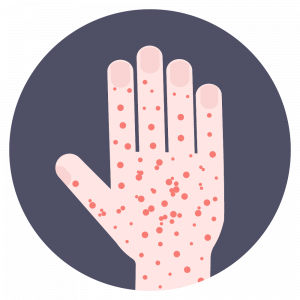On This Page:

Measles is a very contagious disease caused by a virus that lives in the nose and throat of an infected person.
The virus is released when an infected person breathes or coughs. It spreads easily from person to person through the air or by direct contact with nose or throat discharges from someone who is infected. Measles symptoms include fever and a rash that starts on the face at the hairline and spreads to the neck, trunk, arms, legs, and feet. A cough, runny nose, or red, itchy eyes might also be present. Symptoms usually begin 7–14 days after exposure, but can appear up to 21 days after exposure. Measles is a serious illness that can cause complications that lead to hospitalization and even death.
For the latest information on measles cases in Virginia, please visit the Reportable Disease Monthly Surveillance Report.
Measles is easily preventable.
A safe and effective vaccine that prevents measles is given as part of the measles, mumps and rubella (MMR) vaccine or the measles, mumps, rubella, and varicella (MMRV) vaccine series. Since measles-containing vaccines became available in the United States, the disease has become rare in this country. Two doses of the vaccine are given to provide lifetime protection. The first dose is given at age 12-15 months and the second dose is given before kindergarten entry (age 4-6 years). Over 90% of the U.S. population is vaccinated against measles and approximately 95% of kindergarteners in Virginia are vaccinated against measles. However, infants younger than 12 months old are too young to be vaccinated. These infants and others who are not vaccinated are very susceptible to infection if they are exposed to someone with measles.
Am I protected against measles?
You are considered immune and protected against measles if you have written documentation (records) showing at least one of the following:
- You received two doses of measles-containing vaccine, and you are a(n)
- School-aged child (grades K-12)
- Adult who will be in a setting that poses a high risk for measles transmission, including students at post-high school education institutions, healthcare personnel, and international travelers.
- You received one dose of measles-containing vaccine, and you are a(n)
- Preschool-aged child
- Adult who will not be in a setting that poses a high risk for measles transmission, including students at post-high school education institutions, healthcare personnel, and international travelers.
- A laboratory confirmed that you had measles at some point in your life.
- A laboratory confirmed that you are immune to measles.
- You were born before 1957.
If you’re unsure whether you’re immune to measles, you should first try to find your vaccination records or documentation of measles immunity. To check your immunization status, call your healthcare provider or request records from the VDH Immunization Record Request Form.
Measles Exposures in Virginia: 2025
The Virginia Department of Health (VDH) was notified that members of the public may have been exposed to measles at locations in DC on March 19 and 22. Anyone who is at risk of developing measles (i.e., has never received a measles-containing vaccine) should watch for symptoms for 21 days from the date of your potential exposure.
If you are experiencing symptoms of measles, contact your healthcare provider right away. Call ahead before going to your healthcare provider’s office or the emergency room to notify them that you might have been exposed to measles and ask them to call the local health department. This will help protect other patients and staff.
Virginia residents with additional questions about their potential exposure can call the Virginia Department Health at (804) 363-2704 or email epi_response@vdh.virginia.gov.

